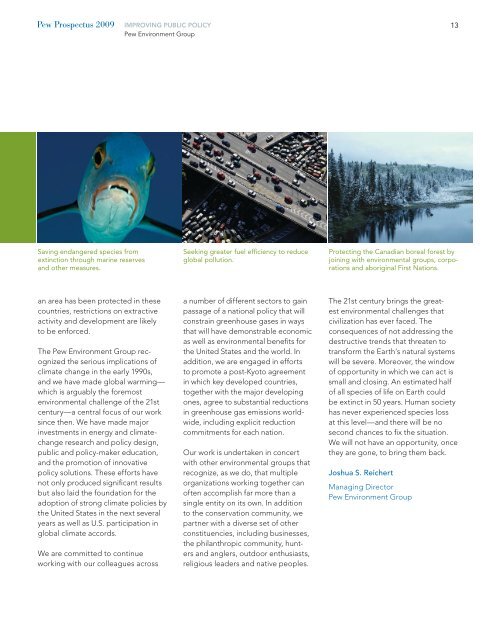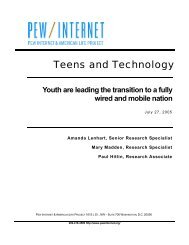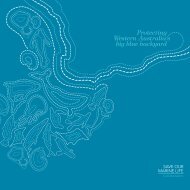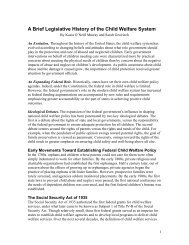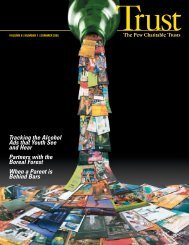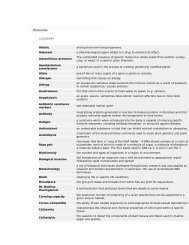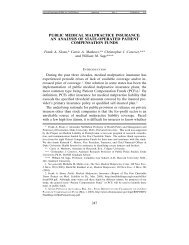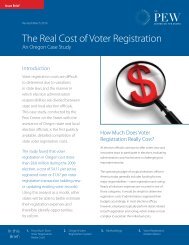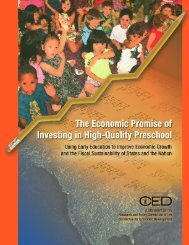PROSPECTUS - The Pew Charitable Trusts
PROSPECTUS - The Pew Charitable Trusts
PROSPECTUS - The Pew Charitable Trusts
Create successful ePaper yourself
Turn your PDF publications into a flip-book with our unique Google optimized e-Paper software.
<strong>Pew</strong> Prospectus 2009<br />
IMPROVING PUBLIC POLICY<br />
<strong>Pew</strong> Environment Group<br />
13<br />
Saving endangered species from<br />
extinction through marine reserves<br />
and other measures.<br />
Seeking greater fuel efficiency to reduce<br />
global pollution.<br />
Protecting the Canadian boreal forest by<br />
joining with environmental groups, corporations<br />
and aboriginal First Nations.<br />
an area has been protected in these<br />
countries, restrictions on extractive<br />
activity and development are likely<br />
to be enforced.<br />
<strong>The</strong> <strong>Pew</strong> Environment Group recognized<br />
the serious implications of<br />
climate change in the early 1990s,<br />
and we have made global warming—<br />
which is arguably the foremost<br />
environmental challenge of the 21st<br />
century—a central focus of our work<br />
since then. We have made major<br />
investments in energy and climatechange<br />
research and policy design,<br />
public and policy-maker education,<br />
and the promotion of innovative<br />
policy solutions. <strong>The</strong>se efforts have<br />
not only produced significant results<br />
but also laid the foundation for the<br />
adoption of strong climate policies by<br />
the United States in the next several<br />
years as well as U.S. participation in<br />
global climate accords.<br />
We are committed to continue<br />
working with our colleagues across<br />
a number of different sectors to gain<br />
passage of a national policy that will<br />
constrain greenhouse gases in ways<br />
that will have demonstrable economic<br />
as well as environmental benefits for<br />
the United States and the world. In<br />
addition, we are engaged in efforts<br />
to promote a post-Kyoto agreement<br />
in which key developed countries,<br />
together with the major developing<br />
ones, agree to substantial reductions<br />
in greenhouse gas emissions worldwide,<br />
including explicit reduction<br />
commitments for each nation.<br />
Our work is undertaken in concert<br />
with other environmental groups that<br />
recognize, as we do, that multiple<br />
organizations working together can<br />
often accomplish far more than a<br />
single entity on its own. In addition<br />
to the conservation community, we<br />
partner with a diverse set of other<br />
constituencies, including businesses,<br />
the philanthropic community, hunters<br />
and anglers, outdoor enthusiasts,<br />
religious leaders and native peoples.<br />
<strong>The</strong> 21st century brings the greatest<br />
environmental challenges that<br />
civilization has ever faced. <strong>The</strong><br />
consequences of not addressing the<br />
destructive trends that threaten to<br />
transform the Earth’s natural systems<br />
will be severe. Moreover, the window<br />
of opportunity in which we can act is<br />
small and closing. An estimated half<br />
of all species of life on Earth could<br />
be extinct in 50 years. Human society<br />
has never experienced species loss<br />
at this level—and there will be no<br />
second chances to fix the situation.<br />
We will not have an opportunity, once<br />
they are gone, to bring them back.<br />
Joshua S. Reichert<br />
Managing Director<br />
<strong>Pew</strong> Environment Group


